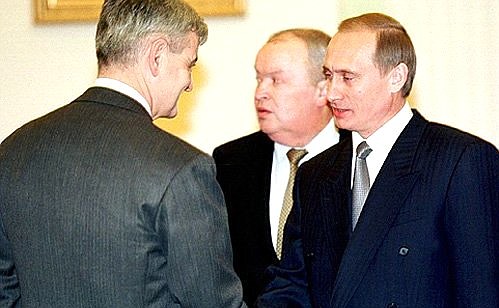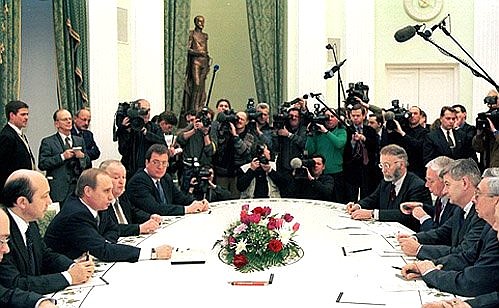They discussed topical aspects of bilateral partnership and joint efforts on the international scene.
Mr Putin pointed out the progress of Russian-German partnership lately somewhat dropping pace. The year 1999 cut Russian imports from Germany by a third, and German companies drastically reduced investment activities in Russia.
He was rather critical of German spokesmen’s position in international financial institutions discussing partnership with Russia. The acting president found the German stance on those issues tougher than that of Russia’s other partners.
In that connection, the Russian leadership sees overcoming the slump and preventing a break in economic and political contacts among pivotal challenges of bilateral contacts. Mr Fischer, in his turn, highlighted German interest in developing strategic partnership with Russia.
The negotiators came to an understanding for contacts at the level of the two countries’ economy and finance ministers. They confirmed the importance of defence ministries’ interaction and Russian readiness to further extend parliamentary contacts.
Putin and Fischer exchanged opinions on a number of practical projects in Russian-German economic partnership. In particular, Russia expressed dissatisfaction with the slow pace of implementing an AN-70 aircraft design project. As the vice-chancellor replied, despite its approval of the project, Germany had problems due to the stances of other partner countries, mainly France.
The negotiators paid major attention to foreign political issues, in particular, Russia’s role as a UN Security Council permanent member.
The Parties also discussed the North Caucasian situation. Whatever international organisations wanted to visit the North Caucasus they were given the opportunity, and their representatives saw what complicated tasks were tackled in the military sphere and economic rehabilitation, Mr Putin said. As he pointed out, Russia remained open on the issue, and willing to carry on constructive co-operation with the international community. The German leadership never argued Russia’s right and duty to fight the terrorist threat in Chechnya, Mr Fischer stressed.

